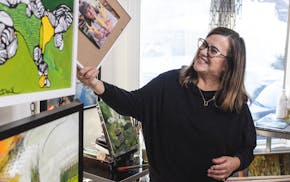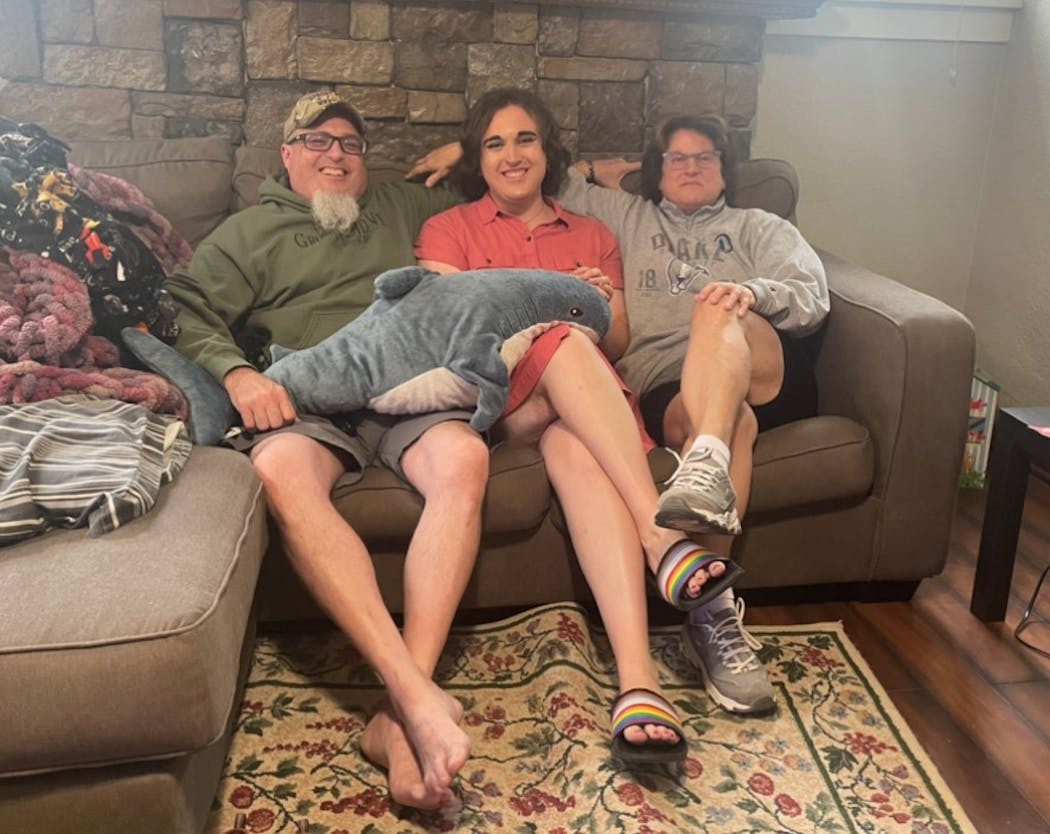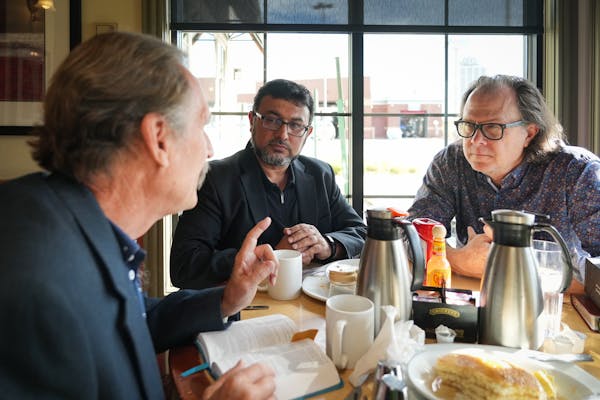You could see nothing but a weightless joy spilling from TV reporter Nora Reichardt as she signed off with her new name.
"In Des Moines, I'm Nora J.S. Reichardt for Local 5 News. We Are Iowa," she said to the camera.
Once she finished her take, she couldn't help but throw in a little hand clap. "Got to say it! Got to say it! Ah, that's so cool!"
"I have been waiting a very long time to say that," Reichardt, 24, later told me. "This hasn't been the easiest process in the world, but to have moments where I get to see everything come together and announce that this is who I am, I'm here, and I'm happy — that's what all this is for."
Reichardt, who grew up in Minnesota, came out to her audience last week as a transgender woman. It was the final but most public piece of her transition — a journey that gradually revealed who she was to her friends, colleagues, family and viewers.
To prepare for the final leap, she reached out to someone with a similar journey, KARE 11 anchor Jana Shortal, who came out as gay and traded her anchor-lady dresses for pocket squares, while very much in the public eye.
"I didn't know if there was a place for me in an industry that can be so fixated on what it wants from its reporters," Reichardt said. "But Jana helped me believe that, 'No, this industry is going to change around you.' Getting to hear that and starting to believe that is a big part of what got me here."
Over their talks on Zoom, Shortal learned that Reichardt wasn't naïve about the obstacles ahead. The Twin Cities news veteran wanted to protect Reichardt from the inevitable jabs from hostile viewers and Twitter trolls.
"She's wildly smart and empathic, and understanding of the world around her," Shortal said. But it was also clear that Reichardt "knew very deeply in her soul that this wasn't a choice."
Soon, the question became: How can Reichardt keep working and reintroduce herself, slowly and safely, with dignity and respect? "She wasn't either asking for permission, nor begging for forgiveness," said Shortal.
Reichardt told her story last week in a moving video produced by her former colleague, KARE 11's Eva Andersen. Reichardt said people may feel like they're losing a loved one when a person transitions. She assured them they would be "getting someone better," someone happier.
After Reichardt's piece aired on the 6 p.m. broadcast, in came a crush of messages. Yes, some were cruel, but they were drowned out by the swell of positivity from all corners of the country.
It just might be the edge of change.
"People don't wake up tomorrow and decide to understand something they don't know," Shortal said. "They have to be presented with a person they do know, in a gentle, kind and extended-hand kind of way. And Nora had the opportunity to do that."
Searching for self
Reichardt grew up in Hanover, Minn., a rural town of about 3,600 on the western outskirts of the Twin Cities metro. An only child, she says her most defining trait was being "a little too talkative for my own good." Socially awkward but energetic, she came out of her shell at Buffalo High School, where she joined the yearbook and newspaper staff. Video games and Spider-Man comics were her favorite hobbies, and they still are.
"I'm just a dork," she said.
But an unsettledness began to dog Reichardt during the pandemic. Isolation turned to introspection. A recent graduate of Drake University, she had landed a great job telling stories for the Des Moines news station, but a mental weight started to take its toll. She wondered: When my life ends, is this how I want to be? The answer was no.
She began counseling in September 2021. Within just a few sessions, she came to accept that she was transgender, and began hormone replacement therapy in February.
The universe of people who knew of her transition started with her therapist and a handful of friends. As Reichardt became more comfortable with her new identity, she wanted more people to know her true self, including close colleagues. Their immediate support melted some of her fears. She finally told the newsroom about her transition in September before taking a couple of weeks' leave of absence.
She used that time off to face one of the hardest parts of her journey: coming out to her mom and dad.
"I do love my parents a lot, but I have other trans friends who don't get to have that relationship with their parents anymore, and I was scared that I would end up in a similar position," said Reichardt.
'I don't want to keep hiding'
She invited her parents, who now live in Waconia, to visit her in Des Moines. With a fresh haircut, she put on a salmon-colored, cinch-waist dress and a full face of makeup. When Reichardt answered the door, her mom looked like she was in shock. Her father slipped into dad mode.
"When I first seen Nora standing there in her makeup and dress, I just grabbed her and gave her a big old hug," recalled her father, Robert Scott Reichardt. "It's still my child. I don't think there was ever anything Nora would have ever said to me that would make me not want to be part of their life."
They sat down and talked. "I wanted to show them, 'Hey, my friends know me as Nora. This is the person that I am. I want to be that person around you. I don't want to keep hiding,' " she said. "And they didn't want me to, either."
The information was overwhelming, but her parents were happy to see her happy.
"It was a smile we hadn't seen in a long time," said Reichardt's mom, Clarise. She worries for her daughter's safety, but couldn't imagine not accepting her.
"We know there are families that lost their children to suicide, just because they feared rejection," she added. "Our child is alive, healthy and happy. We can call her, we can text her, we can write. Our child is alive."
"We're not grieving," Robert added.
Too often, Reichardt says, trans people are in the news for bathrooms and sports, discussed only as a political wedge.
"I don't want trans kids growing up in 10 to 20 years having to deal with that, feeling like the only thing people want is to keep them out of doing the things they love," she said. "That's why it's been so important for me to present myself as a human first. I'm still a slightly-too-talkative-for-my-own-good reporter, but I also happen to be trans."
When I spoke to Reichardt's parents, they were excited about how much their child could help others. Even as they apologized for alternating pronouns, they bubbled with a supercharged parental pride.
"I just think he's an amazing person. You knew he would do great things," Clarise said. "I think she's destined to do even greater things."
Yuen: How success has pushed Minnesotans off sidelines in trans athlete debate

Yuen: When cancer struck a second time, she found 'euphoria'

Yuen: The University of Minnesota's first male dance team member is turning heads by staying real
Yuen: How George Floyd's aunt healed her heart and lent her voice for justice




